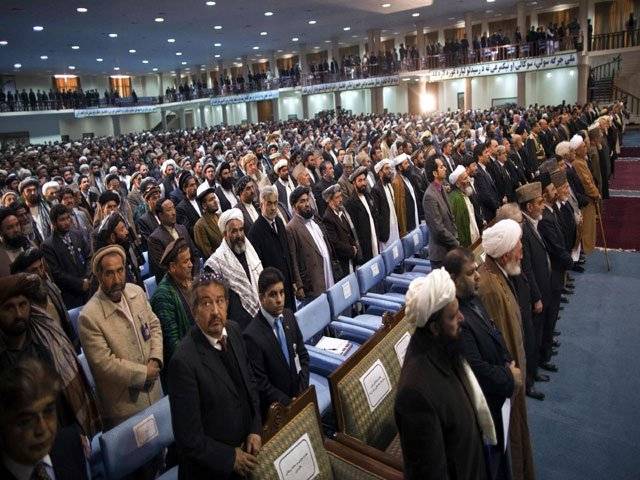KABUL (Agencies) Afghanistan wants the United States and Nato to agree to stop carrying out night raids on Afghan homes, hand over control of detention centres to Afghan troops and disband international bodies as pre-conditions to Kabul signing a strategic partnership with Washington, President Hamid Karzai said on Wednesday. Karzai told day one of the loya jirga that he wanted Afghan-US relations to be those of two independent countries and assured neighbours such as China and Russia that a long-term deal would not affect their ties with Afghanistan. He convened the four-day jirga to secure backing for a strategic partnership deal with the United States currently under negotiation which will govern American involvement in Afghanistan after the deadline for the exit of foreign combat troops by the end of 2014. Afghanistan is also negotiating similar agreements with Britain, France, Australia and the European Union, Karzai said. Night raids, which foreign troops say are one of their most effective weapons in the fight against insurgents, are a major cause of friction between Karzai and his Western backers. The Afghan leader has said repeatedly he wants them stopped. We want to have a strong partnership with the US and Nato, but with conditions, Karzai said. We want our national sovereignty, and an end to night raids and to the detention of our countrymen. We dont want parallel structures alongside our government, Karzai told a meeting of around 2,000 Afghan political and community leaders. We want our national sovereignty and we want it today. We want our relationship with America to be one of two independent countries. Karzai also called on the US to disband international bodies - such as combined civilian-military reconstruction teams which play a governmental role - as conditions of the deal. But if Washington meets demands such as these, Karzai said Afghanistan was prepared to host US troops in the long-term. If they want military installations, we will allow them, it is in our benefit, money will come to us and our forces will be trained, he said. Do we need their help? Yes we do, but on condition that Afghanistan should not be trampled. Washington insists it is not seeking a permanent military presence in Afghanistan, saying it is looking to help Afghan security forces with intelligence sharing, air power and logistics beyond 2014. US officials say a deal could involve shared facilities with Afghan forces. Karzai also reassured Afghanistans neighbours, many of whom are concerned about a long-term US influence in the region, that any strategic partnership deal would not hamper relations with them. Afghanistan sees its national interest in having good relations with neighbours and want our independence to have good relations with neighbours such as China, Russia and others, he said. The Taliban, who say they will not engage in peace talks until all foreign troops have left Afghanistan, have dismissed the meeting as a ploy to rubber-stamp what they see as foreign interference. They said those supporting a long-term US presence in Afghanistan would be considered traitors and deserving of harsh penalties. The militia are not formally represented at the event, but jirga spokeswoman Safia Sediqi said some individual Taliban supporters may be representing local communities. We welcome everyone, she added. The Taliban have already tried to disrupt the gathering, even though Kabul is under a security lockdown for the meeting. Karzai, who switched between speaking Afghanistans Pashto and Dari languages when addressing the jirga, likened Afghans to lions on several occasions. Americans are more powerful, have more money, a greater population, but we are the lions, he said, bringing applause from delegates. The jirga holds no legal authority, but if the group backs Karzais demands it could give him extra leverage in negotiations over the deal to keep some American troops in Afghanistan another decade despite opposition from his people and the war-weary US public. Parliamentarians say the meeting is unconstitutional because it sidelines the legislature, which should be the body to consider such national issues. Key figures such as Karzais main rival, Abdullah Abdullah, and former ally, Soviet-era warlord Abdul Rashid Dostum, are boycotting the jirga as unconstitutional amid concerns over how delegates were appointed.
Friday, April 19, 2024
Karzai wants end to Nato night raids

SC suspends ECP’s re-polling order in PP-51
April 19, 2024
Court approves plea bargain of Parvez Elahi’s co-accused
April 19, 2024
Zardari creates another parliamentary record
April 19, 2024
KP politicians, civil society laud President’s address
April 19, 2024
A Tense Neighbourhood
April 19, 2024
Dubai Underwater
April 19, 2024
X Debate Continues
April 19, 2024
Hepatitis Challenge
April 18, 2024
IMF Predictions
April 18, 2024
Kite tragedy
April 19, 2024
Discipline dilemma
April 19, 2024
Urgent plea
April 19, 2024
Justice denied
April 18, 2024
AI dilemmas unveiled
April 18, 2024
ePaper - Nawaiwaqt
Advertisement
Nawaiwaqt Group | Copyright © 2024





